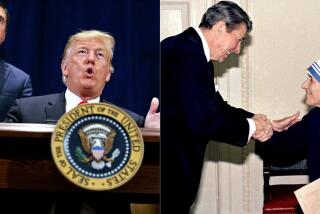Reagan Pledges Opposition to Dictators ‘Left or Right’
WASHINGTON — President Reagan formally declared today that the United States is opposed to totalitarian governments “whether of the left or the right” and will actively seek to bring about democratic change.
Administration officials said Reagan’s statement, outlining his views on human rights and the role of the United States in the developing world, reflected no new policy approaches, but it was clear that its delivery was timed to coincide with the President’s press for $100 million in aid for the Nicaraguan rebels.
Reagan’s critics frequently have accused him of attacking Marxist-leaning countries for military aggression and human rights abuses while turning a blind eye to similar transgressions by anti-communist governments friendly to the United States.
Haiti, Philippines Cited
In a message to Congress titled “Freedom, Regional Security and Global Peace,” Reagan noted the overthrow of the Duvalier government in Haiti and the Marcos regime in the Philippines.
“These trends are far from accidental. Ours is a time of enormous social and technological change everywhere, and one country after another is discovering that only free peoples can make the most of this change. Countries that want progress without pluralism, without freedom, are finding that it cannot be done.”
“In this global revolution,” Reagan said, “there can be no doubt where America stands. The American people believe in human rights and oppose tyranny in whatever form, whether of the left or the right.
“We did not create this historical phenomenon, but we must not fail to respond to it,” he said.
He said the United States will use its influence “to encourage democratic change in careful ways” that respect other countries’ traditions and political realities as well as external threats.
A senior American official said the policy statement represents no shift and is part of a series of national security messages.
Reagan, who has been repeatedly criticized for de-emphasizing human rights in his foreign policy, told Congress that it faces “important choices . . . whether to undercut the President at a moment when regional negotiations are under way and U.S.-Soviet diplomacy is entering a new phase; to betray those struggling against tyranny in different regions of the world, or to join in a bipartisan national endeavor to strengthen both freedom and peace.”
The official, who asked not to be identified, said “the precise timing” of the policy statement “is a bit coincidental” but it “clearly relates to the campaign for aid to promote democracy.”
Reagan’s statement still calls leftist dictatorships the greater threat to world peace. But it attempts to capitalize on his recent role in helping to remove right-wing dictators in the Philippines and Haiti and to blunt charges that the Administration follows a double standard on human rights.
More to Read
Sign up for Essential California
The most important California stories and recommendations in your inbox every morning.
You may occasionally receive promotional content from the Los Angeles Times.










